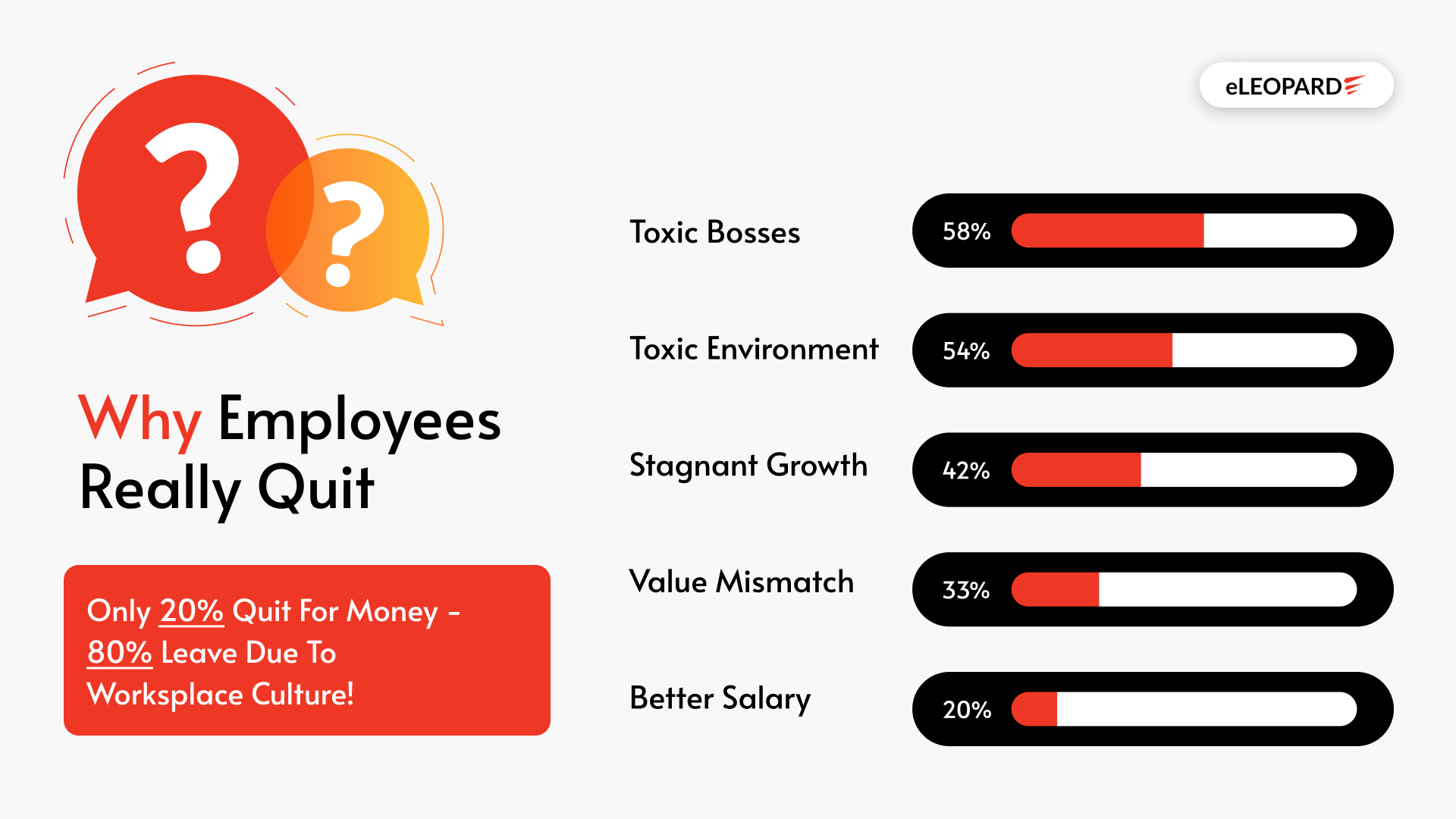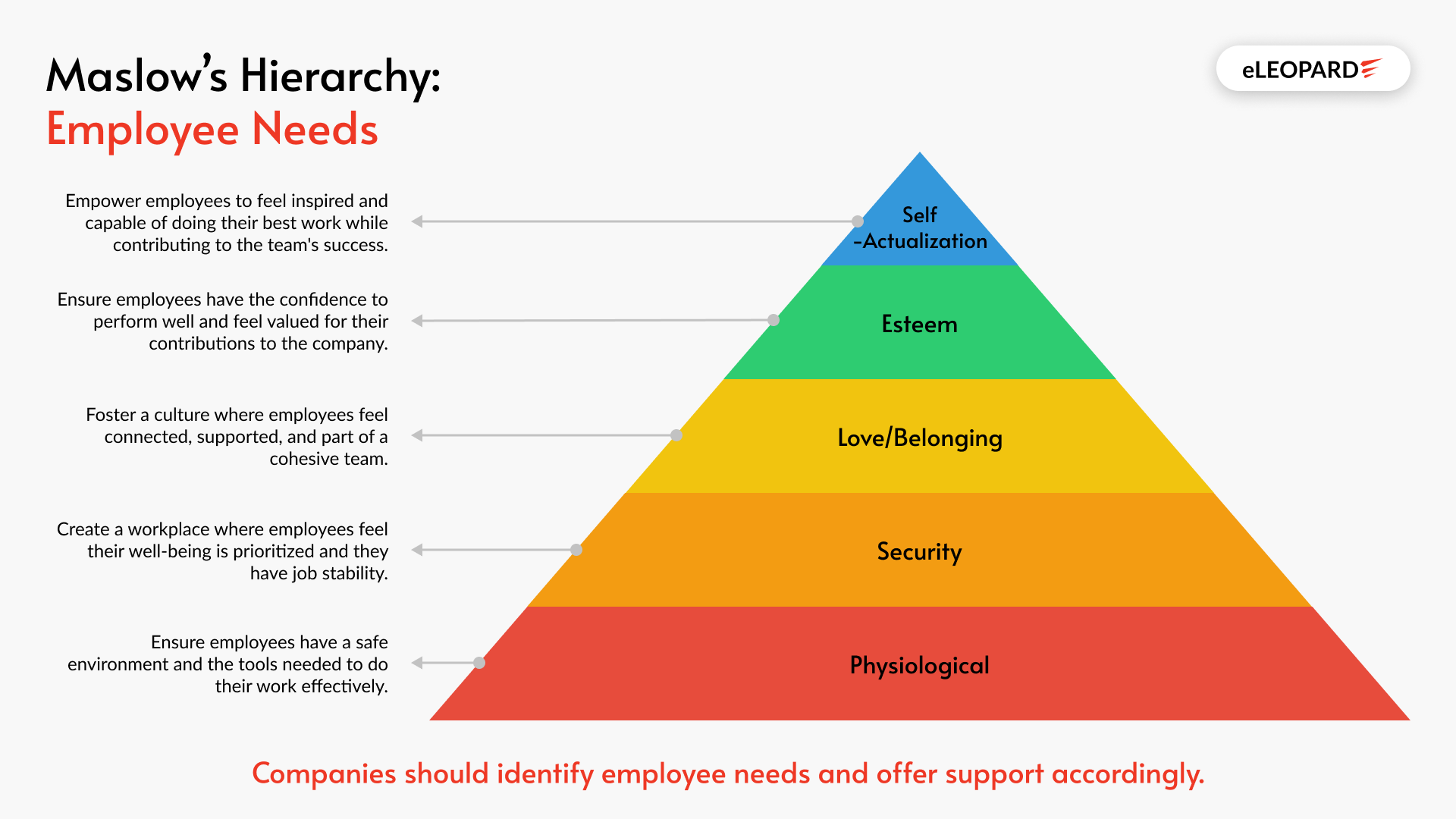It may sound strange, but it’s true! The workplace isn’t only about providing “HIGHER SALARIES”; let me explain to you why.
Whenever a company and its management provide satisfactory salary increments to their employees, based solely on their personal preferences, it becomes their assurance that they will stay with their company now, and that’s why getting their resignations, especially from these specific employees, is one of the hardest things a company and its management can face.
But you all will be shocked to know that:
“As per the “Harappa Insights Report 2024”.
- Only 20% of the employees left their jobs for better salaries.
- 58% of employees cited toxic bosses as the reason for quitting, while 54% left due to toxic workplace environments and unethical employers.
- 33% resigned because there was a mismatch between the values of the employees and their companies.
- Around 42% of the participants cited stagnated career growth as a key factor leading to their resignations.
The survey also revealed that a staggering 86% of Indian employees plan to resign from their current positions within the next six months due to poor workplace conditions. Additionally, 61% of the respondents expressed a willingness to accept a lower salary in exchange for a better work-life balance.
Having a poor work environment is unavoidable; this not only creates workplace stress but also makes your employees feel disenchanted with their jobs. This often becomes the worst when employees feel that they have little support from their superiors and management, and then, with no option left, results in resignations.
However, there are some ways that a company and its management can adapt to avoid such situations:
Work Content & Work Context
It’s really important to hire the right people for the job roles, but it’s even more important to assign the right tasks to those people so that they feel motivated to perform their tasks better and engage fully with their responsibilities with all their interests. Always assign tasks to your employees that not only match their skills but also enhance their skills, lead to their career growth, motivate them to do better, and match their future goals too.
Follow the Maslow theory (Different people have different needs)
As management person, we all have studied this theory, i.e., Maslow’s hierarchy of needs (Basic Physiological Needs, Safety Needs, Love and Belonging Needs, Esteem Needs, and Self-Actualization Needs) given by a significant person of management named “Abraham Maslow”, which includes managers should identify which level of needs their employees are currently focused on and provide support accordingly but don’t know why we forget to apply it in our practical work lives.
Let me share with you that, based on the Gallup Workplace Report 2024, only 14% of Indian employees feel they are “thriving,” while 86% are “struggling” or “suffering.” Why? Because somewhere the company or the management is not fulfilling their needs, which motivates them to do work efficiently and effectively. So, being a company or management, it’s really important to consider the needs, goals, and aspirations of each employee, which can be analyzed by understanding the following:
1. Basic Physiological Needs
2. Safety Needs
3. Love and Belonging Needs
You would likely agree that working in a company with a toxic culture is the worst environment for anyone to be in, because if an employee does not feel a sense of belonging in a company, then the employee can never get fully engaged in their work either. Whenever an employee senses that they belong and are a good fit within your workplace and team, it becomes easier for them to feel motivated to put in hard work and achieve results. So, a company should develop an environment where employees can sense a feeling of belonging or the part of the company, which can be achieved by taking some small steps:
- Providing ownership of the tasks, so that they feel valued.
- Provide proper and equal access to information relevant to tasks.
- Involve your employees in making decisions relevant to their tasks.
- Always appreciate their loyalty and hard work.
- Support your employees when they are actually in need.
- Organise the team interaction activities.
4. Esteem Needs and Self-Actualization Needs
Emotional Support
Whenever we talk about a company, it’s important to remember that it’s nothing but a group of humans who can have different emotions based on their personalities and mental strengths, and that’s why it’s the responsibility of the companies and their management to consider them as “Human Beings” too. And you all will be surprised to know that, as per the WHO, 15% of working-age adults were estimated to have a mental disorder in 2019. So, being an HR professional is important to support your employees emotionally too, as having such a burden can also lead to mental stress in the employees’ psychology of people, as different people react differently in different situations. For this, you can follow the following steps:
- Keep an eye on the behaviors of the employees, as sudden changes in behavior are also an indicator that your employees are not in a comfortable state of mind.
- Always be ready to take a proactive approach to the employees, as sometimes people hesitate to share their issues with the management.
- Respect the feelings of employees.
- Make an interactive environment.
- Listen to their problems actively and ask what they need.
- Listen without judgment or interruption.
- Don’t disclose their issues with other employees. Always maintain the privacy of the problems.
- Never consider any issues as small; always give importance to their issues, as sometimes the things that seem small to you can be a very big deal for someone else.
Interactive and Fair Management
Being HR, many of us have heard from many candidates that…
“I want to switch from my current company because of the bad environment, and I have also tried to discuss this with our higher management. Still, our higher management does not want to hear and discuss anything with anyone, and that’s why my other colleagues are also resigning, and I am also quitting the same”.
It’s unfortunate that in today’s modern era of digital technology, where the management of many companies, even from startups to MNCs, are mostly available to discuss work-relevant updates and work-relevant emergencies with their employees even after the working hours through the various official communication platforms, like Slack, Google Meet, Skype, etc., they suddenly begin to refuse to do face-to-face communication with their employees or begin to ignore their employees in case of employee’s emergencies or when they are actually in need.
And now the question arises: Did the employee resign on his own? The answer is “No”; it’s the workplace that makes him give up his resignation.
Ignoring the employees when they’re actually in need can not only lead to employees feeling isolated but also to a feeling of being undervalued, resulting in dissatisfaction at work and potential resignations.
You will not be surprised to know that companies that have interactive and fair management are achieving their goals much better than those that do not have it.
So, sharing with you some ways through which any company or management can avoid the above situations:
- Organize one-to-one meetings with the employees.
- Identify the problem if any employee contacts you after working hours, and be there to offer them support accordingly, let them know that you are also there in case of their emergencies.
- Consider offering flexible scheduling options to employees who may need to adjust their hours due to personal commitments or preferences.
- Always try to maintain an open communication environment where the new employees or the old ones can feel comfortable expressing their views, issues, or challenges that they are facing while doing the work or outside of the work.
- In a workplace full of tools and software, sometimes employees just need someone who can actively listen to them to reduce their stress. So, being a part of management, always try to actively approach your employees and meet with employees regularly to show your employees that they’re worth your time and attention. Ask what you can start or stop doing to improve your relationship with them or to reduce their stress.
- Always keep an open and honest “Policies Conversation” with your employees. Unclear policies can stress employees out, so it’s the company’s or management’s duty to avoid making any misleading commitments regarding policies. This can create a sense of distrust among employees, which eventually leads to resignations.
- Always develop guidelines for exceptional cases, i.e., on when and how penalties for missed work or late arrivals will be waived or adjusted during emergencies.
- Avoid favoritism while considering the performance of the employees. Grade them purely based on their hardworking nature and dedication towards the company.
- Don’t forget to prioritize the work-life balance of employees.
- Always treat your employees and their new ideas with respect and dignity because creating a friendly and inclusive atmosphere where employees feel that their ideas are getting recognized by the company or management can not only lead to encouraging innovation but also build a positive work culture.
Work culture plays a very important role in any workplace, as no one can tolerate a toxic culture or a toxic manager. A notable example of this is the viral news from the Times of India titled:
“Pune Sales Executive Quits His ‘Toxic Job,’ Plays Dhol in Front of His Manager.”
This news seems kind of funny, but let’s think for a second: what makes an employee go against their own company??? Did he leave voluntarily??
The answer is a big “NO.” It was the toxic culture and the management that drove him to resign and act against the company.
So, it’s advice to always value your employees because..
“ If you don’t respect your employees, then your competitor will”.
Because employees don’t always resign voluntarily, sometimes, the workplace causes it.
And yes, it may sound strange, but it’s true! The workplace isn’t only about providing “HIGHER SALARIES”; and this time, I think I don’t need to explain to you all why.


